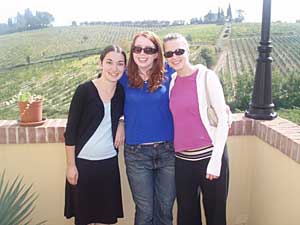JYA
Journal—Notes From Abroad
Anna Newman ’09 writes from
her perspective in Florence, Italy.

Anna Newman ’09 (left) poses with her JYA housemates
Morgan Middlebrook ’09 (middle) and Julia Tommasco (Middlebury
College) in front of the Italian countryside. |
JYA
Journal with:
|
By Anna Newman ’09
One of the first words I learned in Italy was sciopero.
It means “strike,” as in the phenomenon that
occurs at least once a week in this country, when a disgruntled
group of Italians decides to voice their discontent. During
my year abroad, I’ve had plenty of practice using this
new addition to my vocabulary.
One of the groups that most often goes on strike is the
Florence city bus company ATAF. When the bus company strikes,
it dramatically impacts my life in Florence, since I live
too far away from the city center to walk to and from home
every day.
The strikes of the city
buses are usually announced at least a week in advance,
in tiny blurbs in the newspapers stating that the buses
won’t be running during certain periods
of time during the day.
These bus strikes have become a part of my normal life,
and I am no longer surprised when I hear news of yet another
one. Next Tuesday, a strike has been called for three hours
during the day. As far as which three hours, who knows?
This will be followed
by another of ATAF’s favorite
actions of protest: driving exactly according to traffic
regulations. Instead of speeding when they are late, or casually
running through a light that has just turned red, the bus
drivers will obey all of the rules of the road. This simple
act of obeying the law results in mass delays and long waits
at the bus stops. However, not even obeying the law has proved
effective for ATAF in getting its demands met. And so they
continue to protest and to go on strike and probably will
until I leave Italy in June.
The ATAF strikes are not the only Italian demonstrations
that have affected my daily life. My third day in Florence,
there was a protest by immigrants at Palazzo Vecchio, which
we could hear during class right across the piazza. In late
November, there was a massive public transportation strike
throughout all of Italy, resulting in the cancellation of
my flight to Brussels for the weekend. On the first day of
the university class I audited, all of the university students
went on strike and didn't go to class.
I have seen many more
strikes and protests during my time in Italy; here, they
are daily occurrences. Whenever Italians have complaints
about something, they take to the streets, carrying signs
and waving banners. Some of the demonstrations are relatively
minor: high school students protesting the condition of
their school building, students at the faculty of medicine
at the University of Florence boycotting all classes while
wearing lab coats and masks. Other strikes have dramatic
impacts on life throughout the country: a strike of anesthesiologists,
creating a back-up of surgeries in hundreds of hospitals.
Or, just last month, a strike of the cargo transportation
industry—tractor trailers refused
to transport such essential goods as gas, fresh fruit and
vegetables, instead parking in blockades on the highways,
for several days, before a resolution was agreed upon.
Italians know how to make their voices heard.
As annoying as the constant
strikes are, I can't help but admire the Italian spirit
in these cases. They may not be choosing the most effective
mode to effect change in their society, but no one can
accuse Italians of being apathetic. And maybe, when I return
to the U.S., I’ll remember
my Italian experience and make my voice heard. |























